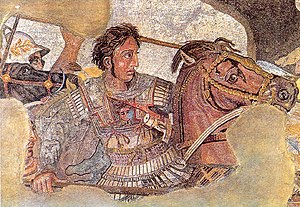THAT'S a real man.
So all sarcasm aside, I decided that today's entry will be a belated tribute to the fifth anniversary of the Iraq Not-quite-so-war-because-Congress-never-had-to-declare-war-so-the-president-can-do-fuck-all-thank-you-very-much-Founding-Fathers. Congratulations, guys! Not only did you pull the wool over America's eyes, but you managed to staple that wool to American faces. It's a good thing we all love Britney Spears too much to pay attention to the real world, because otherwise you guys would be going out much the way Hussein did.
So. Today. We talk about famous tacticians in history. Why? Because God knows there ain't a tactician (political or military) among the inbred clowns hailing to the chief inbred clown.
Without further ado:
Alexander the Great

If he has "the Great" in his name, you know he has to be...well...pretty good.
Alexander was born to King Phillip II of Macedon and his wife Olympias. King Phillip apparently had a dream before Alexander's birth that he sealed his wife's vajay-jay with the seal of a lion. Apparently that meant Alexander would be born with the character of a lion. I just think it was a weird sex dream.
Alexander's most famous tutor was Aristotle, a man famous for metaphysics, science, politics and telling everyone to be nice. Aristotle apparently gave Alexander a copy of the Illiad which Alexander kept as his prized possession, sleeping with it and a dagger under his pillow. That way, he could either stab an attacker or bludgeon them with 200 pounds of book.
Alexander served under his father and accomplished himself in battle by defeating an elite hoplite army of Thebes. Soon after, Phillip was assassinated, with some suspicion being cast on Alexander. Not enough, apparently. Alexander assumed the throne of Macedon at the age of 20.
Greek states like Thebes and Athens thought this would be the best time to regain their independence, with a noob king on the throne. They didn't factor in the "the Great" part into their plans. Alexander showed up at the gate of Thebes, which quickly surrendered. Later, Thebes would rebel again and Alexander would raze the city to the ground, enslaving its citizens and eating its babies.
Having established himself the firm leader of Macedonia, Alexander was free to move on to Persia and India, slaughtering and conquering (they sort of go hand in hand) as he would. Something that earned him a lot of dislike amongst his fellow officers was the fact that he adopted a number of Persian customs as well as a few Persian consorts. Alexander had a respect for other cultures that sort of was at odds with his destruction of most of them.
Now. On to the good stuff. Tactics. Phillip, Alexander's father, was the first to make a 100% professional army, while most other armies were composed of mercenaries and civilians. This way, he had a fully trained and loyal army. He also pioneered a number of tactical innovations like the Macedonian phalanx, which used long, two-handed spears and shoulder-mounted shields to create sort of a wall of death advancing, unstoppable, into the enemy.
Alexander's contribution was the heavy use of heavy cavalry to charge at the flank of the enemy, sapping morale and creating a panic amongst units not yet engaged in battle. Alexander's tactics included a good amount of this morale-sapping, using unexpected and sudden tactical moves that would cause confusion in his enemy.
Sun Tzu...the not quite as great

I want that beard.
Sun Tzu is actually not the guy's name. It is an honorific that was given to a man named Sūn Wǔ, who wrote The Art of War. I'll refer to him as Sun Tzu, because I hate having to copypaste the other name repeatedly.
There isn't quite as much known about Sun Tzu. The only biography of him describes him as a landless aristocrat, accomplishing himself by hiring himself out as a sort of military consultant. He apparently trained a battalion of females lead by the close concubines of King Helü, under which Sun Tzu served. At first, they would laugh at his orders and disobey them. Then he killed a few of their leaders. And then they listened. That's a tactician.
He is best known for writing a treatise originally called Sun Tzu. But it came to be known as the big book of war, or The Art of War. The book is STILL famous. It is said that Mao Zedong and Stalin both carried his book around. And with rave reviews by big names like that, it has to be good.
The Art of War has had a great influence on tactics. It stresses the importance of all aspects of war, of supplies, information, economic preparation, planning and fire. Its major theme is stressing the importance of adaptability. Being able to react effectively in a variety of situations and turning any conditions under which a military leader finds themself to their advantage. More practically, it speaks about positioning. Positioning in relation to both environment and enemy. It is positioning that formed the core of Alexander's victory and adaptability that pushed him through.
For more information: http://en.wikipedia.org/wiki/The_Art_of_War
For a sort of Cliff Notes edition: http://suntzusaid.com/
End
Ah, for the good old days, where men were men, women were women and all other cultures were to be squelched beneath the giant greaved foot of military oppression.
It's a good thing we don't have any of that now.
No comments:
Post a Comment